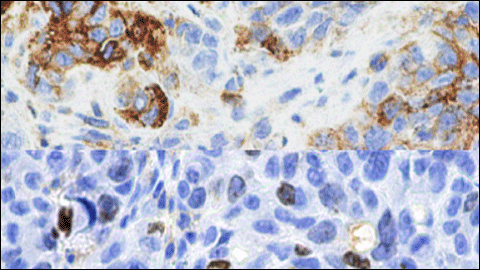Nanodrug achieves selective depletion of metastatic stem cells in animals

A research published in Embo Molecular Medicine points to a new option for the prevention of metastasis of human colorectal cancer with the use of a nanodrug which selectively eliminates metastatic stem cells, something no drug on the market has been able to do until now.
06/09/2018
Researchers from the UAB, the Sant Pau Institute for Biomedical Research (IIB Sant Pau), the Hospital de la Santa Creu i Sant Pau, the Spanish National Research Council and the CIBER’s Bioengineering, Biomaterials and Nanomedicine (CIBER-BBN) recently published an article in one of the most prestigious international journals in the field of molecular medicine, the EMBO Molecular Medicine. The article demonstrates the efficacy of a nanodrug developed by the researchers themselves which selectively eliminates metastatic stem cells in animal models for colorectal cancer.
The research team, led by members of the CIBER-BBN Ramón Magues (belonging to the IIB Sant Pau), Antonio Villaverde and Esther Vázquez (both from the UAB Department of Genetics and Microbiology), has demonstrated that the drug work only on the cells which cause the metastasis through its specific interaction with a peptide present in the protein nanoparticle transporting it and the CXCR4 cell receptor which is overexpressed in tumour cells. This allows attacking only tumour cells, blocking their ability to spread at the initial stages, and thus preventing a metastasis and at the same avoiding the adverse effects associated with the most common treatments.
It has been noted that this receptor is overexpressed in at least twenty different types of cancers, such as prostate, mammary, ovary and other not so common cancers such as pancreas cancer. Therefore, this nanoparticle can be used to treat different types of neoplasms, turning it into a highly versatile means to transport different highly potent therapeutic molecules.
There are currently no drugs on the market capable of selectively eliminating metastatic stem cells. That is why this discovery may have a high clinical impact as soon as the regulatory trials have been conducted before applied in humans. The Sant Pau Hospital will be the first centre in the world to conduct clinical trials of this drug with patients, before implementing it in clinical practice.
Nanoligent, a new spin-off created to finance the nanoparticle
In June 2017, researchers at the IIB Sant Pau, the UAB Institute for Biotechnology and Biomedicine and the CIBER-BBN, who now sign the article publisehd in EMBO Molecular Medicine, created the spin-off Nanoligent with the aim of devleoping the first drug designed to eliminate metastatic stem cells.
This firm, which includes over ten years of research studies, is directed by Manuel Rodríguez Mariscal, a professional with an extensive experience in the field of investment and creation of biotechnological companies. Its mission is to find the funding needed to complete this project.